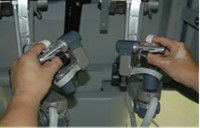
One of the most important segments of the Phase III of the Hospital Modernization Project in B&H is education of the medical personnel in the Severance Hospital in Seoul, Korea.
Severance Hospital was established in 1885 as the royal hospital (Korea’s first western-style hospital). Today, Severance Hospital is the most reliable and leading research institution, an institution offering the most diverse and personalized medical education in Korea. It comprises of 48 clinical departments, 8 specialised centres, 16 specialized clinics and 40 committees.
According to the data from 2012 Hospital Severance had 5 da Vinci systems (Robotic Surgery), 9 MRI & iMRI , 5 PET-CT, 7 CT & CT-simulators, 8 angiographies, 2 tomotherapies, 1 gamma knife, 3 linear accelerators and 7 gamma cameras.
In the short term, our medical staff that will participate in the training and education related to clinical practice and procedures will:
• Improve healthcare competence and the capacity
• Understand and utilize the new medical technologies
and in the long term staff will:
• Improve the expertise
• Contribute to the advancement of medical technology
• Cut down the number of the RS/Bosnia mortality
• Improve the level of health care system
• Strengthen business competence in the health care, technology transfer and friendship between South Korea and RS /Bosnia
It was originally planned to carry out education that will cover 5 huge fields of expertise:
• Ophthalmology
• Gastroenterology
• Nuclear Medicine
• Cardiology and
• Hospital Management
 Management of the Clinical Centre decided not to participate in the education (5 persons, 1 week) but to allocate the budget line (costs planned for education of Management) in the amount of 32 500 US$ for the pocket money for the staff that will participate in educational trainings. Accordingly, the education will cover 4 fields of expertise.
Management of the Clinical Centre decided not to participate in the education (5 persons, 1 week) but to allocate the budget line (costs planned for education of Management) in the amount of 32 500 US$ for the pocket money for the staff that will participate in educational trainings. Accordingly, the education will cover 4 fields of expertise.
Considering the fact that the education in the field of ophthalmology covers procedures that the Clinical Centre Banja Luka which are already applied in daily practice (Vitreoretinal surgery, Optical coherence tomography and Pascal laser), the Clinical Centre proposed to significantly shorten the duration of education in ophthalmology, to increase the number of participants of educational trainings in nuclear medicine and to increase the number of participants and duration of education in gastroenterology, within the same budget.
The proposed education plan for our medical staff is:
Ophthalmology
| Field | Period /weeks | Position |
| Vitreoretinal surgery | 2 weeks | Doctor |
| Optical coherence tomography and Pascal laser | 1 week | Doctor |
| Optical coherence tomography and Pascal laser | 1 week | Doctor |
| Vitreoretinal surgery | 1 week | Nurse |
| Vitreoretinal surgery | 1 week | Nurse |
| Optical coherence tomography and Pascal laser | 1 week | Nurse |
Nuclear medicine
| Field | Period /weeks | Position |
| PET/CT and SPECT/CT | 6 weeks | Doctor |
| PET/CT and SPECT/CT | 6 weeks | Doctor |
| PET/CT and SPECT/CT | 6 weeks | Doctor |
| PET/CT and SPECT/CT | 6 weeks | Doctor |
| PET/CT and SPECT/CT | 4 weeks | Nurse |
| PET/CT and SPECT/CT | 4 weeks | Nurse |
| PET/CT and SPECT/CT | 4 weeks | Pharmacist |
| PET/CT i SPECT/CT | 4 weeks | Specialist in Nuclear Physics |
Cardiology
| Field | Period /weeks | Position |
| Electrophysiology | 2 weeks | Doctor |
| Interventional cardiology | 2 weeks | Doctor |
| Electrophysiology | 2 weeks | Technician |
| Interventional cardiology | 2 weeks | Technician |
Gastroenterology
| Field | Period /weeks | Position |
| ERCP |
EUS
EMR and ESD3 weeksDoctorERCP
EUS
EMR and ESD3 weeksTechnician
With regard to the different possible dates for the beginning of education, the Clinical Centre Banja Luka suggested to start with education in Ophthalmology on August 25th, 2014, whereas the education for all other medical fields (Nuclear Medicine, Gastroenterology and Cardiology) is supposed to start on September 15th

 Standard procedure for work of the ethical committee of the clinical center (kc)
Standard procedure for work of the ethical committee of the clinical center (kc)